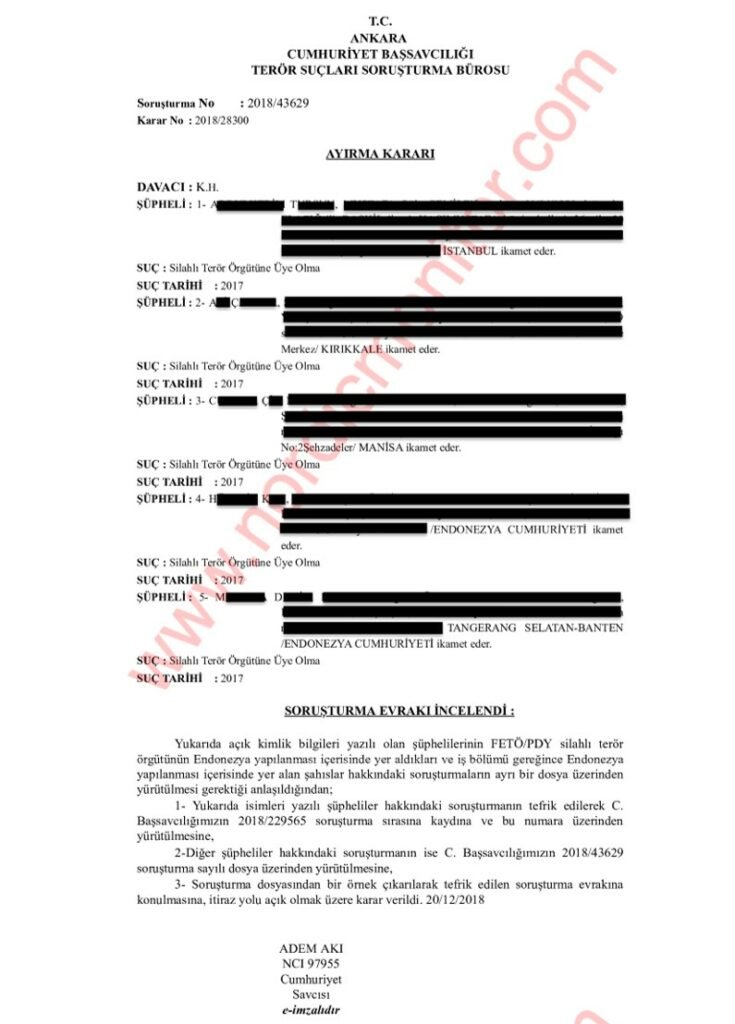The Turkish diplomatic mission in Indonesia engaged in a campaign of intelligence gathering and collected information on the activities of critics of Turkish President Recep Tayyip Erdoğan, Nordic Monitor reported, citing judicial documents.
The information collected by the Turkish Embassy was used in criminal indictments on charges of terrorism by a Turkish prosecutor. According to a December 20, 2018 decision by prosecutor Adem Akıncı, the Ankara Chief Public Prosecutor’s Office launched a separate investigation (file no. 2018/43629 ) into five Turkish nationals who were listed in espionage files dispatched by Turkish diplomats in Indonesia without any concrete evidence of wrongdoing
As a result of a massive purge the Turkish judiciary, intelligence service, diplomatic missions abroad and law enforcement have become abusive tools in the hands of the Erdoğan government to prosecute critics, opponents and dissidents. The criminal justice system has often been abused by Erdoğan to persecute government critics, leading to the imprisonment of tens of thousands on false charges.
Judicial documents expose how the Turkish Embassy in Indonesia triggered criminal investigations in Turkey. (The names and addresses of the Turkish nationals have been redacted for security reasons.):
Profiling files were conveyed to the foreign ministry by Mehmet Kadri Şander Gürbüz, the Turkish ambassador in Jakarta between 2016 and 2018.
Critics of the Erdoğan government abroad, especially members of the Gülen movement, have been facing surveillance, harassment, death threats and abduction since President Erdoğan decided to scapegoat the group for his own legal troubles. They have often been denied consular services such as power of attorney and birth registry as well as having their passports revoked. Their assets in Turkey are seized and their family members at home risk criminal charges.
Turkish President Recep Tayyip Erdoğan has been targeting followers of the Gülen movement, a faith-based group inspired by Turkish cleric Fethullah Gülen, since the corruption investigations of December 17-25, 2013, which implicated then-Prime Minister Erdoğan, his family members and his inner circle.
Dismissing the investigations as a Gülenist coup and conspiracy against his government, Erdoğan designated the movement as a terrorist organization and began to target its members. He intensified the crackdown on the movement following a coup attempt on July 15, 2016 that he accused Gülen of masterminding. Gülen and the movement strongly deny involvement in the abortive putsch or any terrorist activity.
According to a statement from Turkish Interior Minister Süleyman Soylu on February 20, a total of 622,646 people have been the subject of investigation and 301,932 have been detained, while 96,000 others have been jailed due to alleged links to the Gülen movement since the failed coup. The minister said there are currently 25,467 people in Turkey’s prisons who were jailed on alleged links to the Gülen movement.
As previously disclosed by Nordic Monitor, the foreign ministry sent lists of profiled Turkish nationals in two CDs to the Ankara Chief Public Prosecutor’s Office, the national police and Turkey’s intelligence agency MIT on February 19, 2018 via an official document for further administrative or legal action, the punishment of their relatives back in Turkey and the seizure of their assets.
Public prosecutor Akıncı, who received the foreign ministry document on February 23, 2018, forwarded the classified CDs including information on 4,386 Erdoğan critics to the organized crimes unit of the Ankara Police Department for further action. The police conveyed the results of its investigations to the public prosecutor.
Akıncı, who led the investigation into the assassination of Russian Ambassador Andrei Karlov in December 2016, was accused of suppressing the evidence that the killer had links to various jihadist groups including al-Qaeda and was radicalized by several pro-government imams, including two who worked for the government religious authority, the Diyanet. Nordic Monitor previously reported that several suspects told the court that Akıncı had forced them to testify during interrogation that the assassination was directed by the Gülen movement. They were later jailed after declining the prosecutor’s request to testify to that in court.











